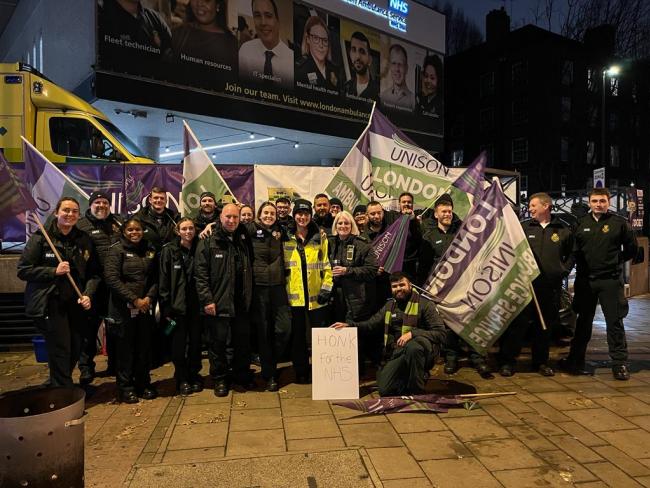
20 December 2022: striking ambulance workers outside the headquarters of the London Ambulance Service. Phot courtesy LAS Unison.
When a strike takes place, when workers withdraw their labour, they and their employers are confronted with the truth: workers are essential to capitalism.
They, not the owners of capital, are the ones who built and continue to build this country. They, not the employers, are the ones who create value.
The employers, of course have never been happy with their dependence on workers. And ever since trade unions were formed attempts have been made to render them either illegal, or ineffective.
In 1799 and 1800 the British parliament enthusiastically passed the Combination Acts, which made it illegal for workers to unionise as a group to ask for better working conditions. Supporters of the new laws included William Wilberforce, the campaigner against the slave trade, who considered trade unions a “general disease in our society”.
The British ruling class was always and still is particularly suspicious about trade unions, because in this country – where they were born in illegality – unions grew from below. No politician decreed their growth, no church defined their membership.
'The British ruling class was always and still is particularly suspicious about trade unions, because in this country - where they were born in illegality - unions grew from below....'
And so, as ever, resistance bred oppression. New laws followed. The Combination Acts were repealed in 1824, then brought back a year later after a wave of strikes, finally being taken off the statute book by the Trade Union Act of 1871.
Since the 1960s governments (Labour and Conservative) have sought to reduce the power of organised workers.
Labour tried to tie the unions’ hands with what it called a “Social Contract’ in the 1970s. It promised reforms as long as unions guaranteed pay claims below the rate of inflation.
It was the old, old lie that wages fuel inflation, still repeated endlessly even though every prolonged period of high inflation has left workers worse off.

Now Rishi Sunak’s government is trying another tactic: it wants to introduce legislation which would make it illegal for health and other essential workers to take action.
Ministers are now discussing the introduction of what are known as Minimum Service Level Agreements to the emergency services. These would allow strikes to happen but impose a legal floor on how limited the resulting service on a strike day would be.
It’s a typically grotesque move by a government that clearly doesn’t understand the meaning of the word “irony”. As waiting lists mount in the NHS, does the government realise that most services it is responsible for haven’t been up to what most workers would consider minimum levels for years?
The idea of using “minimum service levels” as a weapon in the class war has been brewing for a while. Back in 2010, for example, the employers’ organisation The Chartered Institute of Personnel and Development (CIPD) was urging the government to consider a range of what it called “high stake options” if confronted with strikes in key industries.
In the Covid-19 pandemic, supermarket workers and lorry drivers were suddenly given the “essential” label by the government. Legislation in this area will cast its net wide.
But vicious though the threat is, workers should take heart. The government is only considering the idea because it is weak.
For decades governments have imposed, progressively, the tightest restrictions on striking anywhere in the industrialised world. It has made it as hard as possible for unions to obtain a legal mandate for industrial action.
And yet workers are taking action, in huge numbers. Worse for the government, “the public” appear to support the strikes.
That should come as no surprise. After all, “the public” is overwhelmingly made up of other workers, all of whom face rising and often unaffordable price increases.
The government’s weakness is compounded by the justified fear of its MPs that many of them – and not just those in the “red wall” areas – will lose their seats at the next election. Already some are breaking ranks to demand fresh negotiations with the nurses.
More will break ranks, sensing the fear and indecision in Downing Street. Good news for the new year.
